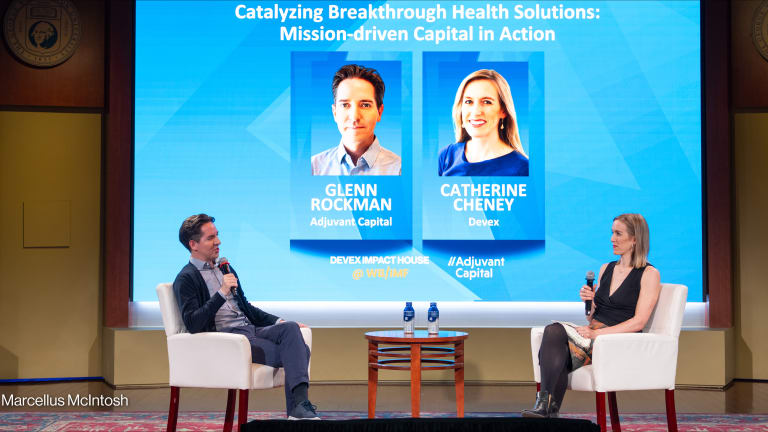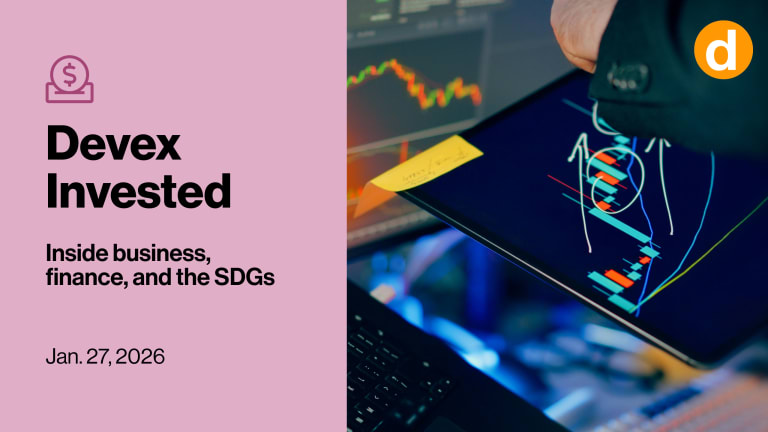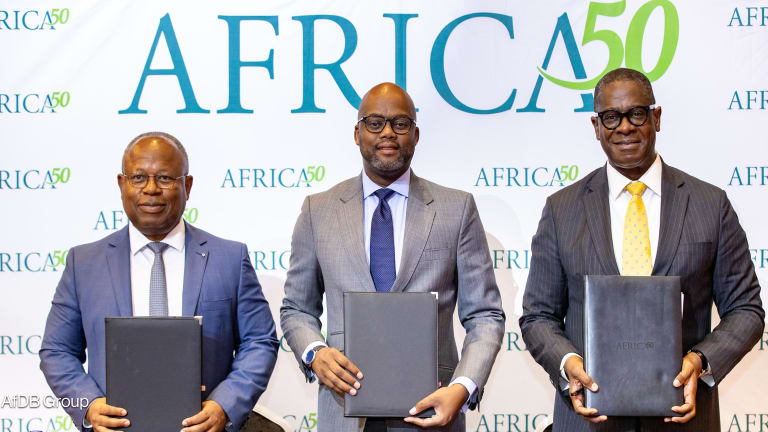
Livio Valenti, co-founder of Vaxess Technologies, was among the entrepreneurs pitching Silicon Valley investors at the Emerging Markets Venture Forum in Napa, California, hosted by the International Finance Corporation of the World Bank Group earlier this month.
Valenti and his team have raised $15 million from groups including the venture capital firm Norwich Ventures as well as the National Science Foundation, the National Institute of Health, and the Bill and Melinda Gates Foundation.
“A combination of investors is really key,” he told Devex of the reason his life sciences company, which is developing a protein derived from silk to stabilize vaccines so they can be shipped without refrigeration, is seeking financing in the form of venture capital as well as grants. “Venture capital will bring the efficiency, which will create that ultra performing organization, and the public health investment will bring the purpose,” he added.
The IFC wants venture capitalists to take a close look at these opportunities
The International Finance Corporation brought Silicon Valley venture capitalists together at an invitation-only forum in Napa, California, as part of efforts to crowd in the private sector. Devex takes a peak inside.
Venture capitalists take a part of the company when they invest in startups, but their support can draw foundations and other public sector funders, whose grants can derisk the technology and draw further private sector investment, Valenti said. While he knew the public sector had a strong interest in making vaccines more accessible and available, he said he wanted to create a company that could create financial returns, and address a major global health challenges as it does so.
The annual forum, hosted by the venture arm of the IFC, is part of a broader effort by the World Bank to crowd in the private sector as part of its From Billions to Trillions initiative. Venture capital is one source of finance that might contribute to the $2.5 trillion of funding that will be needed to achieve the United Nations Sustainable Development Goals by 2030. And the forum, focused on tech trends and investment opportunities in emerging markets, also drew experts on the role venture capital might play in financing areas including health and education.
"The way I see Silicon Valley, it remains to be cutting edge in developing new technologies, identifying new models and systems, that may not be initially geared towards developing markets but could have a role in developing markets,” Nikunj Jinsi, global head of venture capital at the IFC, told Devex. "IFC has a role to play as an enabler to help develop ecosystems in markets that are not traditionally oriented towards that Silicon Valley mindset."
He said venture capital operations are becoming essential for development finance institutions. The IFC allocates a certain amount of capital for highly risky projects, from direct investments in emerging market startups to support of local funds and accelerators. And the Napa forum allows the IFC at the World Bank to raise awareness of its venture arm, and position itself as a potential partner to the Silicon Valley investors in the room.
Often, Jinsi says, he will hear from venture capitalists that they want to “make a buck,” and they are worried the IFC is okay with not making a buck.
“That's actually not the case,” he said. “We're clearly operating with a double or triple bottom line. We are driven by sustainable investments.”
Sustainable investments means the IFC needs to see financial returns, he said. Its venture group invests in technologies or models that impact emerging markets, no matter where they are based, with education tech investments including Coursera in Silicon Valley and Byju’s in India, to name some examples. IFC always co-invests with private sector partners, like Learn Capital in the Coursera investment and the Chan Zuckerberg Initiative in the Byju’s investment, so it must be aligned with their return expectations.
The IFC is also in a unique position to prepare investments that might be suitable for venture capital down the road, Jinsi said, providing solar energy as one example that is now drawing venture capital interest as the price declines to unprecedented lows.
“Where there is sugar, there will be ants,” Lexi Novitske, principal investment officer at Singularity Investments, said in reference to a common expression in Nigeria, where she is based.
She spoke with Devex about her concerns regarding impact-focused business models in areas such as agricultural technology and clean energy, that are rising up to chase the new money available to them.
“These are certainly real solutions to real problems, but I think what’s been done, which is actually detrimental to the ecosystem, is a lot of low-cost capital that needs to extend investments to these sort of models [and it] has [been] done it a little bit too lightly,” she said.
Development finance institutions can play a number of key roles in leveraging venture capital to finance the SDGs, said Chika Nwobi, who started the Rise Capital investment firm in Nigeria. The first is to invest directly in startups. The second is to catalyze investment by supporting local funds, like his, which he set up after his experience launching a company without support systems in his own country.
Nwobi said he also sees value in development finance institutions convening forums to build connections between venture capitalists who are already making investments in markets such as Nigeria and those who might not yet realize the opportunity to achieve financial returns as well as development impact through their investments in emerging markets.
As more DFIs develop venture capital arms, observers say they might learn from the experience of the IFC. While it can sometimes cost more to chase down money than the return is even worth, the venture arm of the IFC is taking steps to ensure that these are in fact investments, not grants. For example, the IFC sent Olawale Ayeni, who leads the venture practice of the IFC in Africa, from Washington, D.C., to Lagos, so that he could read the market signals, for example by observing how consumer behavior is changing.
See more stories on Going for Goals:
► Opinion: Global health — why we need win-win solutions
► Beyond ecotourism: what the travel sector can really do for development
► How Vodafone is supporting health delivery in Africa
► Opinion: Innovative financing methods driving better healthcare for all
There are, however, limits to the role venture capital can play in financing solutions to global challenges such as those embodied by the SDGs. This is particularly the case with Silicon Valley venture capital, which is in a category of its own, said Rob Hutter, managing partner at Learn Capital, which funds entrepreneurs in education, has invested alongside the IFC, and is in IFC’s venture funds portfolio. These investors are focused on finding and funding those ideas and companies that can quickly transform markets and behaviors.
"Our interest is paradigm shifting, hyperscale companies that can transform the equation of access and cost essentially as close to overnight as possible for as many people as possible,” he said.
He mentioned Uber as an example of a company that radically transformed personal transportation by deflating the cost and improving the market size. He said he sees potential for similar impact of single companies in areas like education and health care, and this is where venture capital can play a key role. And items on the agenda in Napa that might similarly attract investment included artificial intelligence in emerging markets and applications of blockchain technology beyond fintech.
What is driving Uber's global impact?
Uber has evolved from an app that would summon fancy town cars to the most highly valued startup in the world. So how does Uber's hyper focus on efficiency and rapid growth — 473 cities in 76 countries and counting — impact global development? Devex explores.
Startups need early-stage funders so they can develop their minimum viable product, said Eric Osiakwan, an entrepreneur and investor based in Accra, Ghana. But the investors who support research and development should not then say they can continue to fund the organization into its later stages, he said.
"We need to be more collaborative as opposed to being competitive,” he told Devex. "Donor money can create a problem, but private capital can also create a problem.”
As entrepreneurs from around the world exchanged business cards with investors who might support them at different stages in the growth of their companies, Osiakwan said he thinks DFIs can guide funders of different kinds, from private equity firms to family offices to hedge funds, to do what they do best as they expand in emerging markets.
Over 10 weeks Devex and our partners will take an in-depth look at the innovative financing mechanisms driving forward the 2030 sustainable development agenda. We’ll explore how the funding gap can be filled, ask how cross-sector collaboration can lead to improved global health care, and look at what it takes to build successful partnerships for change. Join us as we examine the innovative financing powering the Global Goals by tagging #Going4Goals and @devex.








